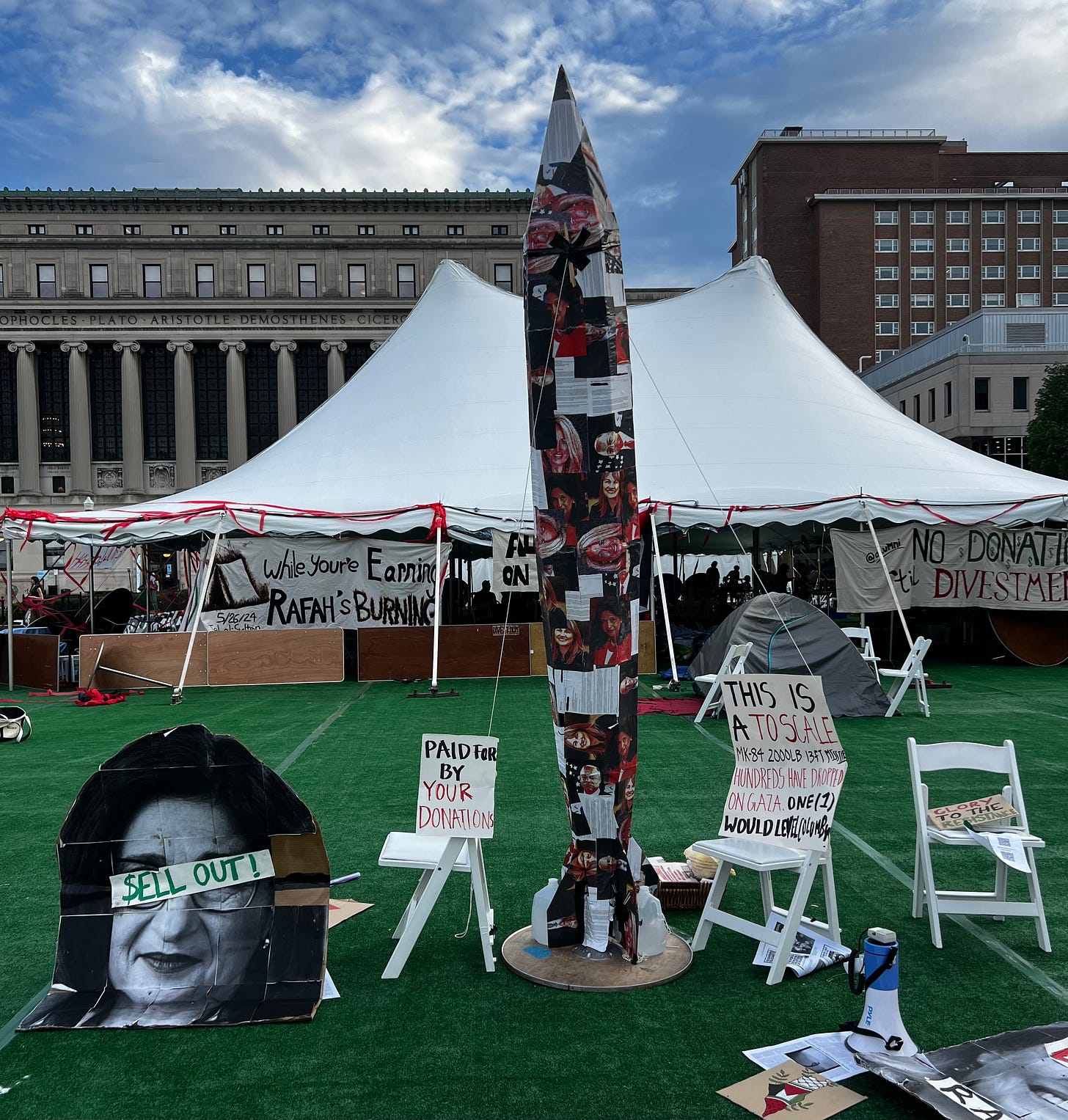The Case for Accountability
Why Columbia’s response to the texting scandal is not enough
Columbia’s leadership is once again behind the curve when it comes to addressing campus antisemitism.
On July 8, the school suspended three administrators for texts they sent each other during a May 31 panel on Jewish life at Columbia, University President Minouche Shaifk and Provost Angela Olinto announced in an email to the Columbia community. The school will also implement antisemitism training for faculty, staff, and students, the message said.
Unfortunately, this is far too little and far too late.
The texts were originally leaked to the Washington Free Beacon in mid-June. The panel the administrators were at featured, among others, a Jewish student and the executive director of the Columbia/Barnard Hillel.
When the panel discussed how many Jews felt safer at the Kraft Center for Jewish Life than on the main campus, Susan Chang-Kim, then-vice dean of Columbia College, texted, “Comes from such a place of privilege.”
Cristen Kromm, then-dean of undergraduate student life, sent two vomit emojis in reference to a campus rabbi’s op-ed about rising antisemitism.
Perhaps most damning of all, Matthew Patashnick, then-associate dean for student and family support, suggested that the head of Hillel was trying to take advantage of the moment for its “huge fundraising potential,” invoking a blatantly antisemitic trope.
In her email, Shafik wrote, “Columbia’s leadership team recognizes this as an important moment to implement changes that will build a stronger institution as a result.”
Josef Sorett, dean of Columbia College, emphasized in a separate email that “some of the texts suggest a seeming dismissiveness with regards to the impact that the global rise of antisemitism has had on Columbia’s campus.” He also emphasized the “loss of trust and the pain this incident has caused.”
Sorett is correct in pointing out rising antisemitism and loss of trust on campus. If an open letter pointing out clear campus antisemitism signed by hundreds of Jewish students is any indication, things must change — and fast, especially when Columbia Students for Justice in Palestine (SJP) stated that they “will be back” after they dismantled their alumni weekend encampment over Memorial Day weekend.
But Columbia’s response, while eloquently worded, does not effectively penalize the administrators responsible for this scandal.
First, the deans involved are still university employees and have not been terminated — they “remain on leave at this time,” according to Provost Olinto’s message. The Washington Free Beacon also reported on July 8 that, according to sources familiar with the matter, the administrators would be reassigned to other positions within the university pending the completion of an investigation. If true, the school will have completely ignored a petition dated July 2 calling for all four administrators to be terminated, signed by over a thousand students and alumni.
If the other deans got a slap on the wrist, Dean Sorett got a handshake and a pat on the back — a simple apology was enough to appease the Trustees to allow him to remain in his position.
The text messages are completely inappropriate for any university official. In December 2023, the presidents of Harvard and the University of Pennsylvania made statements to Congress that were arguably less problematic than the Columbia deans’ texts. Yet, they immediately faced pressure to resign and both later did.
If Sorrett is committed to “setting the culture and tone of the staff of the College” as he claimed in his email, then our situation demands a similar response.
While dismissing the deans would be a positive step to regain the trust of Jewish students, it would do nothing to “set the tone” for the student body. Many immediately liked comments calling the suspensions a “witch hunt” and “McCarthyism” on a Columbia Daily Spectator Instagram post. Some students complained that the university was disciplining these deans instead of Business School professor Shai Davidai, who they allege has smeared protestors as “pro-terror” on X. One user even denied that the texts evoked antisemitic tropes because “usury” (the practice of lending money at high interest rates) is “an ancient characteristic of the Jewish people.”
The students’ reactions highlight their double standard: They are quick to go after Davidai, an assistant professor in the graduate Business School, but whine when the university penalizes deans who have a much more direct impact on student livelihoods. They readily accuse the school of McCarthyism, but I imagine that those same students support Columbia University Apartheid Divest and Columbia SJP when they shout, “We don’t want no Zionists here!” By refusing to acknowledge that disciplining the deans was a step in the right direction, groups like SJP have lost all credibility when they claim to care about the safety of Jews on campus.
The student discourse highlights another problem: University leaders have done little to hold students and faculty accountable for their actions since October 7. Administrators should have followed the recommendations of the Task Force on Antisemitism to enforce violations of our Rules of University Conduct. Instead, they let the Gaza Solidarity Encampment escalate until protestors took over Hamilton Hall. They should have taken robust measures to ensure compliance with Title VI of the Civil Rights Act, which requires universities like Columbia to ensure students have an educational environment free from pervasive ethnic and national origin discrimination. Perhaps the university would have scored better than a “D” on the Anti-Defamation League’s antisemitism report card if they had prioritized accountability.
To Columbia’s administrators — more accountability is the least you can do to eliminate entrenched bias and promote cultural change. The texting scandal suggests that the incivility on campus runs from the students to the administration, and will not improve with mere warnings and long-winded emails.
If we pretend that the actions of those responsible for not just the texting scandal but also the events of the last nine months are trivial, then we will never get the blank slate we need to heal and improve.
No amount of antisemitism training can be a substitute for accountability. We must look closely at those who swear to keep us safe and ask: Are they doing their jobs?
Mr. Engel is a senior at Columbia College studying history and a staff writer for Sundial.








Excellent article. Until professors and administrators are held accountable in the form of termination for their clear antisemitism ,justice will not be served nor will Jewish students be in a safe environment at Columbia.The lack of punishment by being terminated will send an important message to all
This is a teachable moment. What has Columbia taught these "scholars"? Bullying works. Sadly this is not limited to Columbia nor higher education, it starts in the schools.